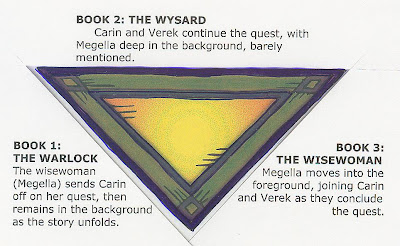For the “Barnes & Noble Review,” Paul Di Filippo wrote a thoughtful and informative analysis of A Wrinkle in Time, the famous YA science-fiction novel by Madeleine L’Engle.
Wrinkle was among my favorite books as a girl. I remember
being utterly enchanted, caught up in the tale as though it were real life.
Intending to reread the story and its sequels, I purchased the Science Fiction
Book Club’s 2003 edition of “The Time Quartet,” which includes A Wrinkle in
Time as well as A Wind in the Door, A Swiftly Tilting Planet, and Many Waters.
Until recently, I’ve been too deep in my own novels—the
Waterspell fantasy trilogy—to reread Wrinkle. But now it’s “time” (pardon the
pun). My novels are published. For the first time in a decade, I actually have
time to do something other than write, revise, and edit.
Paul Di Filippo’s review of A Wrinkle in Time is fascinating
reading. Here’s one passage that particularly caught my eye:
“Her [L’Engle’s] fairy-tale tropes -- abducted parent;
arrival of the Gandalfian stranger(s) initiating a quest; far-voyaging; realms
under a spell; well-met comrades; exotic vistas -- are superbly arrayed yet
never programmatic.”
This list practically demands that I analyze my own work to
see how these elements figure in Waterspell.
ELEMENTS OF “FANTASTIKA”
First, a definition of the word “trope,” a term that is
often used in discussions of speculative and genre fiction: A trope is a common
or familiar theme or device.
Here are the tropes that Di Filippo identifies, with a brief
summary of how they appear in Waterspell.
Abducted parent. In my story, it’s the child (Carin) who is
abducted. But her parents have gone missing too.
Arrival of the Gandalfian stranger. This is an interesting
one. It requires thought to determine which of my characters is THE “Gandalfian
stranger.” Carin herself is a stranger in a strange land. So is Megella, the
wisewoman who acts as the “herald,” the player who brings a message or otherwise
acts to set the events in motion. Verek is also a “Gandalfian stranger.” Like
Megella (and Gandalf), he possesses knowledge and capabilities that are
superior to those of the protagonist, Carin. But also like Gandalf, Verek
requires assistance: he cannot succeed alone. Another candidate for this role
is the monk Welwyn, who provides additional support to Carin in her quest. I
must conclude that my novels brim with enigmatic “Gandalfian strangers.”
Initiating a quest. Megella initiates a quest by sending
Carin off to find her place in the world. Even earlier, however, Carin was
launched on her quest amidst circumstances that I cannot discuss here without spilling
the beans. :-) This idea of questing, which is central to all types of heroic
literature, is illustrated by a rough diagram I created to show the underlying
structure of Waterspell:
Realms under a spell. That’s kind of self-evident from the
series title: Waterspell. In my fantasy world(s), spells wreathe mountains,
meadows, gardens, oceans … all of the bewitchments different, all placed for
different purposes by different practitioners of the art magick.
Well-met comrades. Carin meets a wisewoman, a woodsprite, a
housekeeper, a gardener, and a wizardly monk, each well-disposed toward her, or
at least not actively hostile. She makes deadly enemies too. But it’s her
relationship with the warlock, Verek, that raises the central question: Is he a
well-met friend or a manipulative foe? Is he good or evil? Hero or villain? Do
we root for him or against him?
Exotic vistas. Waterspell’s far-voyaging characters move
through many an exotic landscape. Their travels take them to mountains,
prairies, woodlands, valleys, rivers, seashores, sea cliffs: such lands and
climes as I’ve encountered in my own travels, or read about, or invented in
flights of fancy. One of the perks of writing fiction is the freedom to set
one’s story against wild and dramatic backdrops, whether natural or made-up.
I did not deliberately set out to incorporate into
Waterspell these tropes of the fantasy genre. The story grew around them, or
they grew into the story, as inevitably as a plant roots into soil. Years of
reading fantasy and science fiction planted these elements within me. When the
time was right, when I was ready to write the kind of story I love to read, the
essentials were there, all set to serve me as they have served generations of
storytellers.





No comments:
Post a Comment